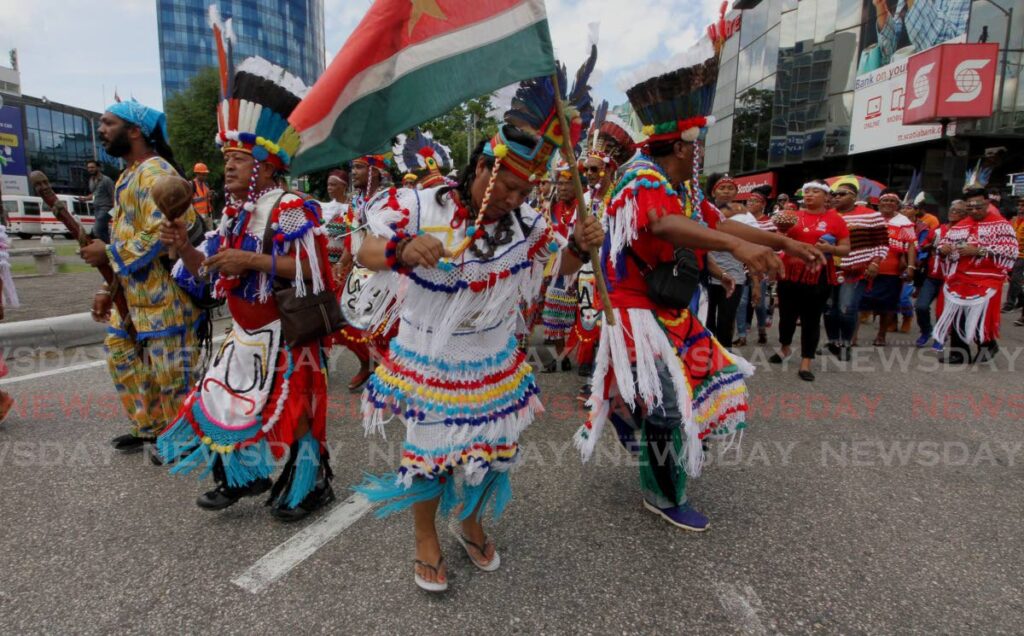JSC told: Do more to help indigenous people

MORE needs to be done to create a space for indigenous people in Trinidad and Tobago.
This was the message from Santa Rosa First Peoples Community Chief Ricardo Bharath-Hernandez and Warao Nation Grand Chief Rabina Shar, during a virtual meeting with Parliament's Human Rights, Equality and Diversity Joint Select Committee (JSC) on Friday.
While Bharath-Hernandez and Shar differed on some points, they agreed that successive governments have not done enough to recognise the rights of TT's First Peoples in accordance with the UN Declarations of the Rights of Indigenous Peoples, adopted by the UN General Assembly on September 13, 2007.
This declaration recalled a previous one adopted on December 20, 2006. Among other things, the 2007 declaration (to which TT is a signatory) recognised that indigenous people should be free from any form of discrimination and have suffered from historical injustices such as colonisation and disposession of their lands.
Bharath-Hernandez recalled that on August 20, 2018, the group received 25 acres of land in Arima for of a First Peoples Heritage Village and Living Museum via a Cabinet decision. This land was given to the community under a lease agreement for 30 years.
While grateful for this gift, Bharath-Hernandez said, "We are saying to do a lease agreement for indigenous peoples is an insult to indigenous peoples."
This land should be given to them as a grant. But should it be given as a lease, Bharath-Hernandez argued the lease should have been for at least 99 years. He described the 30-year lease as unacceptable.
Port of Spain South MP Keith Scotland acknowledged his comments.
"The committee will try to be practical."
Bharath-Hernandez suggested a substantive day of recognition for indigenous people. The First Peoples were recognised in a one-off public holiday in May 2017. Since then they do not have a day when they are recognised like many of TT's other ethnic and religious groups.
Bharath-Hernandez said, "We are like swmming against the tide."
While granting a public holiday for indigenous people is not mandatory. he added, "If not a full holiday, but a day of significance, not just a day of recognition."
He wanted a team set up to fast-track the development of the proposed heritage village and museum.
"That is is lagging on too long. Too many obstacles."
In response to a comment from Sport and Community Development Ministry co-ordinator Dr Donna-Moe Knights, Bharath-Hernandez said the group wanted to have further discussions about proposals for a state agency to manage the village
He recalled a conversation he had between 1995 and 2001 with then prime minister Basdeo Panday about lands for indigenous people. Panday asked how much they would need. Bharath-Hernandez said when he told Panday 400 acres, Panday's reply was, "Why don't you take the whole Northern Range?"
The use of the heritage village by all indigenous groups and an annual day of significance for them is where the Santa Rosa First Peoples Community and the Warao Nation have common ground.
But Bharath-Hernandez observed the Warao Nation is pursuing a different agenda from that of his group. Against this background, he disagreed with a suggestion from Tunapuna MP Esmond Forde to deal with the concerns of both groups simultaneously.
While he cast no judgement on the Warao Nation's focus, Bharath-Hernandez said, "Our coming together will not take us forward."
Independent Senator Hazel Thompson-Ahye related her knowledge of collaboration amongst indigenous people in other countries, for their benefit and their nations' as well. She admitted to being confused about what the two groups wanted Government to do for them.
"I get a sense that they are not satisfied with what happened to them. There is need for mediation."
Tabaquite MP Anita Haynes agreed. "There is a greater need for sensitisation and education."
Shar said his group's focus was on lands allegedly taken away from them from colonial times to the present.
"If our rights are not recognised, how can we contribute (to national development)?"
Shar questioned whether the JSC was giving his group a fair hearing.
JSC chairman Senate Vice-President Dr Muhammad Yunus Ibrahim reminded both groups that in TT "every creed and race find an equal place."
In response to Shar and in reference to Scotland's earlier comments, Ibrahim said one of the JSC's role was to work out possible solutions to concerns raised by groups who come before it.


Comments
"JSC told: Do more to help indigenous people"